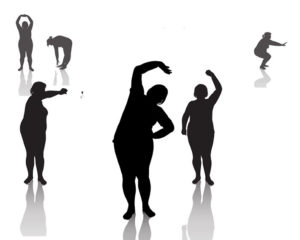People With Overweight/Obesity
Health Disparities Influenced by ZIP Code
Did you know that where you live may be more important than your family tree in predicting health disparities and health longevity?
Why Weight Loss Programs Don’t Work
The weight loss business generates massive revenue, yet the industry seems to have little effect on waistlines. Recently, researchers took an in-depth look at the efficacy of popular weight loss programs.
Yes, You Can Develop Better Eating Habits
Analogous to laying out your exercise gear so it’s the first visual reminder you have of your commitment to exercise each day, imagine what creating strong visual cues for food might do for your eating habits. Placing a simple, attractive bowl of fruit on the counter instead of stowing the fruit out of sight in a refrigerator drawer could make the difference in your quest to eat “5 a day.”
The Transformative Power of a Single Good Choice
Jonathan Ross has received numerous accolades for his work in the fitness industry, including recognition as the 2010 IDEA Personal Trainer of the Year, the 2006 ACE Personal Trainer of the Year, and the 2003 Personal Training Director of the Year by
PFP
magazine. He possesses a rare combination of fitness knowledge and personal experience with obesity, which he acquired while growing up with nearly “800 pounds of parents.” Ross has served as the fitness expert for Discovery Health and hosted its series
Everyday Fitness.
His book,
Abs Revealed,
Obesity and Cancer Risk Among Women
The link between obesity and a higher risk of developing various forms of cancer has been well drawn. When it comes to women, you may be shocked at how significant that increased risk is.
Cut TV Time, Cut Kids’ Blood Pressure Problems
It turns out that spending countless hours in front of the television or computer poses another threat to children: high blood pressure.
Low Intensity vs. High Intensity: Which Is Best for Obese Adults?
The debate continues regarding the most effective exercise measures for reducing abdominal obesity and improving glucose measures.
Research Looks at the Brain; Diabetes
Two distinct mental strategies used to manage pain—focusing attention externally and re-appraising the pain—involve different brain pathways, according to new research using functional magnetic resonance imaging (fMRI). The study appeared in the journal Anesthesiology (2011, 115 [4], 844–51).
Create Enduring Change
Alison L. Steiber, PhD, RDN, serves as chief science officer at the Academy of Nutrition & Dietetics. She previously served as an associate professor and direc- tor of the coordinated dietetic internship and master’s degree program at Case Western Reserve University, where her research focused on nutritional assess- ment, quality of life, functional status, pancreatitis and probiotics.
Cutting Risk For Obesity-Related Cancers
With excess body fat linked to about one-third of cancers, it makes sense to trim down if necessary. A new study released by New York University suggests that the most protective steps against obesity-related cancers are eating a plant-based diet and limiting alcohol intake.
6 Key Factors That Predict Weight Gain
Fitness professionals expend considerable energy helping people to lose weight, but there’s another way to view this challenge: What are the main factors that cause people to gain weight??
Research shows that two-thirds of Americans are overweight or obese (Ogden et al. 2014), a health condition associated with hypertension, cardiovascular disease, diabetes, depression and various cancers (breast, endometrial, colon and prostate) (Malik, Schultz
&
Exercise and Type 2 Diabetes
Did you know that diabetes affects nearly one-tenth of the U.S. population—a widening epidemic with more than 5,000 new cases per day (ADA 2013)? Type 2 diabetes, formerly called non-insulin-dependent diabetes or adult-onset diabetes, accounts for about 90% of diabetes cases (IDF 2014).
First, Do No Harm
A longtime athlete who found himself constantly falling prey to injury, Greg Roskopf, MA, created a new approach to recovery called Muscle Activation TechniquesTM. The process, which helps to identify unique causes of muscle tightness and weakness in order to remedy them, has been used by professional athletes playing for the Arizona Cardinals, Denver Broncos, Utah Jazz and Denver Nuggets, as well as a wide range of other clients.
When You Lose Weight, Where Does It Go?
When a person loses weight, have you ever wondered where it goes? Scientists at the University of New South Wales in Australia have put together a calculation to explain the process. And it turns out most expert theories are wrong.
Obesity’s Impact on Lifespan
Here’s more reason to encourage individuals who are obese to move more and improve their diets: Obesity can chop up to 9 years off a lifespan.
Frequent Sitting Means Weight Gain for Women
Seated desk work has come under fire these past several years as countless studies have linked it with a variety of health problems. But not all associations affect all people. When it comes to weight, a new study shows that the effects of regular sitting differ by gender and race.
Building Self-Efficacy in Overweight and Obese Clients
You know them well: your obese clients who have tried everything: weight-loss meal programs, fat-burner pills, crash diets, gym memberships; nothing worked for very long. When they turned up at your door, low self-efficacy was all they had to show for their sincere efforts to change.
How One Man Lost More Than Half His Body Weight
Intervention. At 493 pounds and with a pants waist size of 78, Josh was close to hitting rock bottom. The significant weight he carried caused him to lose his job and his house, forcing him to move in with his parents. Concerned for his well-being, Josh’s family encouraged him to seek guidance from a qualified fitness professional. That’s when he met Kevin Buchanek, a personal trainer at Personally Fit by Chris Hill.
Study Asks Adults in Great Britain to Self-Assess Obesity
The first step in overcoming a problem is recognizing that you have one. Unfortunately, many obese adults in Great Britain think they weigh less than they actually do.
Obesity’s Workplace Burden
The negative effects of obesity are many—ranging from personal health problems to global healthcare costs. A fresh report from Yale University’s Rudd Center has found that obesity also takes a significant financial toll in the workplace.
Obesity-related absenteeism has been costing the United States $8.65 billion per year in lost productivity, according to the report. Researchers calculated this staggering number by analyzing data from the National Health and Nutrition Examination Survey and the Behavioral Risk Factor Surveillance.


















